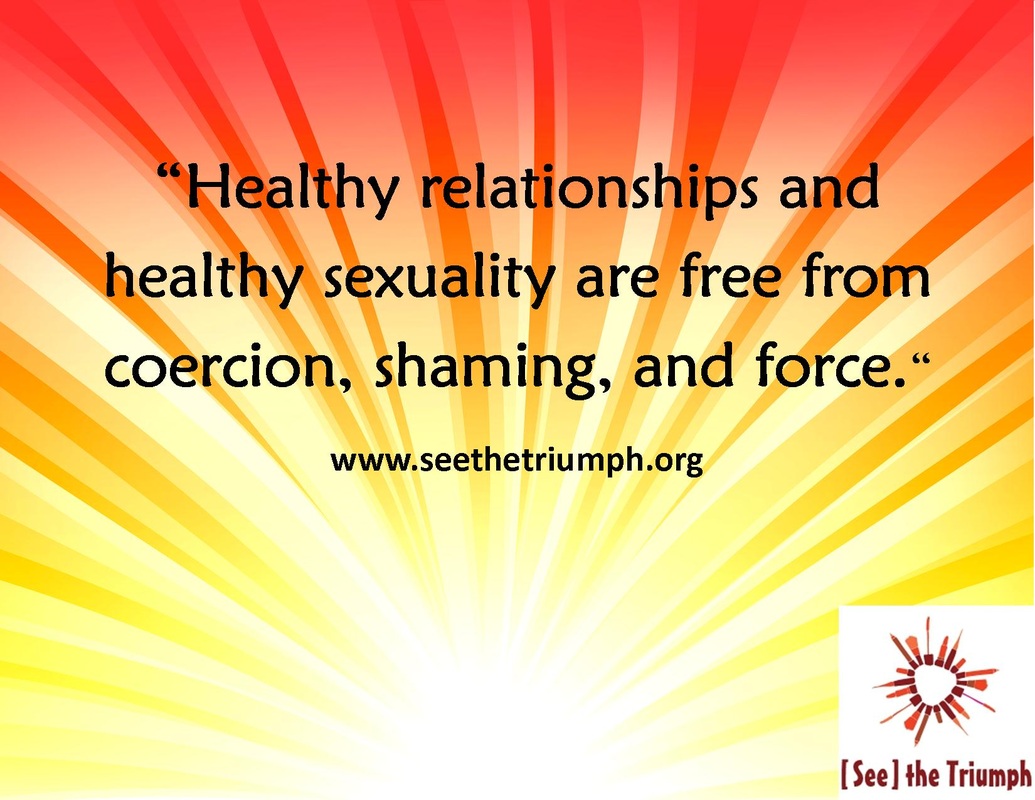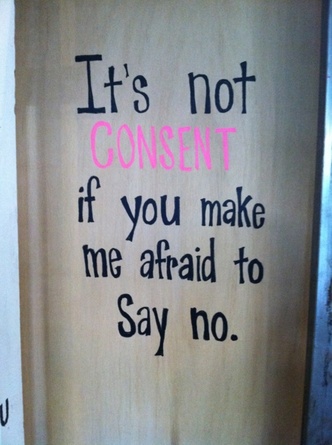|
By Christine Murray, See the Triumph Co-Founder Several years back, anti-sexual assault activists and sexuality educators began using the term enthusiastic consent to signify a shift from “no means no” to “yes means yes” (Gender Focus). Previously, most messaging aiming at preventing rape focused on the importance of saying “no” when someone wants sexual activity to stop, and the importance of the other person respecting that boundary. Understanding when and why to honor a “no” remains critically important. I believe that this is one of the earliest sexual and intimate partner violence prevention messages we can teach to even very young children. As I’ve written elsewhere, as a parent, I've tried to teach this with my own children with tickling--whey they say, “Stop,” I point out how important it is to stop and respect whatever rules other people have about their own bodies. So, I believe that teaching respect for saying “no” is still a valuable and important message. But, when I first heard about the principle of enthusiastic consent, I loved how it captures a real spirit of positive sexuality and respect and support for one’s partner when it comes to sexual activity. The principle of enthusiastic consent came to mind while I was going through some of our research data from the subsample of participants who had experienced sexual assault. For example, one participant who I also cited in my post about revenge porn said, “I am powerless to keep him from doing what he pleases with the videos he took of me having sex without my knowledge or consent.” Although this woman may have been engaging in consensual sex with her partner, clearly his videotaping of those activities was not consensual. Another participant said, “The truth was, it wasn't what I was wearing, what I said, or how I walked. There was no alcohol involved. I had a manipulative partner who wanted to put me down and wanted sex and he wouldn't take no for an answer.” It sounds as though this participant’s partner used relentless, manipulative coercion to wear down the participant until she felt unable to say no. Is that consent? And finally, another survivor said, “[I have shame] that I put up with it for so long, for ignoring my intuition, for believing that I didn't deserve better, that it was my fault for not giving him the sex life he desired, for hurting myself sexually for him.” This quote implies that this participant’s partner shamed her into engaging in sexual activities that he wanted but that were painful to her. Enthusiastic consent becomes very difficult to achieve within the context of an abusive relationship. Last month, we repinned the picture below on our Pinterest page: When someone is being abused, they often are living in a state of fear of their partner, and abusive partners often control their partner’s every move and decisions. To be able to enthusiastically consent to sexual activity, a person needs to have freedom of choice. A context of power, control, and fear runs counter to that freedom of choice.
The principle of enthusiastic consent deserves wider attention in sexuality education programs and public awareness campaigns aimed at preventing sexual assault and intimate partner violence. Healthy relationships and healthy sexuality are free from coercion, shaming, and force. Moreover, they encompass enthusiastic, freely chosen, respectful consent for physical and emotional intimacy by both partners. Comments are closed.
|
Archives
July 2024
CategoriesAll About Intimate Partner Violence About Intimate Partner Violence Advocacy Ambassadors Children Churches College Campuses Cultural Issues Domestic Violence Awareness Month Financial Recovery How To Help A Friend Human Rights Human-rights Immigrants International Media Overcoming Past Abuse Overcoming-past-abuse Parenting Prevention Resources For Survivors Safe Relationships Following Abuse Schools Selfcare Self-care Sexual Assault Sexuality Social Justice Social-justice Stigma Supporting Survivors Survivor Quotes Survivor-quotes Survivor Stories Teen Dating Violence Trafficking Transformative-approaches |
Search by typing & pressing enter




 RSS Feed
RSS Feed